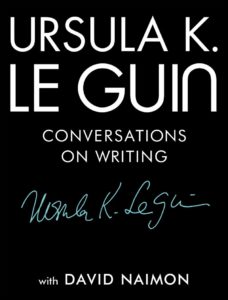Conversations on Writing grew from three sets of discussions between Ursula K. Le Guin and David Naimon for the Oregon radio station KBOO. She completed her introduction to this volume less than four months before her death in January 2018; Naimon wrote his not quite two weeks after her passing, it’s a touching valediction. “I look again at Ursula’s [edits]—her enthusiastic yes!, her matter-of-fact I disagree. In these gestures I see how fully present she is, how completely she attends to the task at hand, and I realize that nothing is too small to contain the whole world, to bring forth Ursula’s powerful, opinionated, captivating self.” (pp. vi–vii)
Over the course of her storied career, Le Guin had many interviews, and her introduction is about how one learns quickly to tell the enjoyable from the excruciating, with a quick segue to how enlightening her talks with Naimon were. “A couple of sessions with Bill Moyers set my permanent standard of The Good Interview. It’s the one you wish could go on. It’s a conversation between people who have thought about what they’re talking about, and are thinking about it now in the light of what the other person is saying. This leads each of them to say things that they may be just discovering. They may not agree, may even have quite fundamental disagreements, but such differences, spoken and answered without belligerence, can take the conversation to a high level of intensity and honesty.” (p. 4) Long ago when I was a bookseller, I had the pleasure of a lunch with Moyers, and I can only agree and add that he had a remarkable recollection of the people he had talked with. I brought up a group of plumbers who he had mentioned in his introduction to The World of Ideas 2, and he was off and running about this group who had stumbled onto the first set of talks that formed The World of Ideas. It was exactly how Le Guin describes an interview that is going well, “The good interview is like a good badminton rally: you know right away that the two of you can keep that birdie in the air, and all you have to do is watch it fly.” (p. 5)
With Naimon, she adds one more key feature: “And every now and then I meet one who realizes that what I really like to do is talk shop. David likes talking shop too. So that’s what we did.” (p. 6)
The roughly 140 pages of interviews are separated into three sections: On Fiction, On Poetry, and On Nonfiction. Naimon introduces each section, situating Le Guin’s work within larger streams of literature, giving a personal take on what she has written, and relating an anecdote or two by means of leading in to the interview itself. The back-and-forth is occasionally interrupted by a full-page quotation from a work under discussion. Sometimes these were welcome refreshers or links to passages that I hadn’t known, but sometimes they seemed like inconvenient commercial breaks in a radio program. Conversations on Writing is congenial and informative, but at fewer than half the pages and with far fewer words on each page, it’s well short of the heft of Words Are My Matter. I suppose I will always want more Le Guin, and there is enough of her work that I will have more for a good while yet, but this volume feels a bit slight, more an appetizer than a main course.
Le Guin is of course terrific, and in Naimon she has a sympathetic listener, someone who knows her work well and can draw her out on both specifics and long-term themes. I mainly wish there had been more of the volleys that Le Guin spoke so fondly about in her introduction, that the two of them had followed more thoughts in greater detail instead of moving on to the next set of ideas. There I go again, wanting more Le Guin. Can’t be helped.
Because I read this as part of my voting for the Hugo award in the category of Best Related Work, I was drawn to comparing it with Traveler of Worlds, which I read for the same reasons in 2017. Conversations on Writing is shorter, but more concentrated. There weren’t any sections that left me thinking worse of Le Guin. I learned more about her perspectives, and some of her thoughts about the art, craft, and business of writing. These are conversations I would enjoy re-reading.

